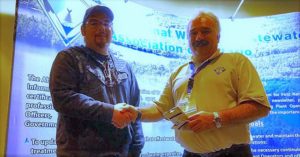Nipissing First Nation’s Aaron Beaucage South End Water Operator of the Year

By Kelly Anne Smith
NIPISSING FIRST NATION—Social media lit up with congratulations for Nipissing First Nation’s water operator Aaron Beaucage when he received the Aboriginal Water Wastewater Association of Ontario (AWWAO) Water Operator of the Year Award.
A post from Chief Scott McLeod reads, “Congratulations to the AWWAO South End Operator of the year Aaron Beaucage.”
Beaucage, the overall responsible operator for Nipissing First Nation’s water and wastewater, is known for taking pride in his job.
Approximately 500 people rely on Beaucage for fresh water and wastewater maintenance. He is responsible for all of the systems and keeping current records on required tests. There is a main plant with nine other smaller systems.
After receiving training and employed as a machinist, Beaucage moved into the operator’s position with Nipissing First Nation.
“Then I went through the steps to get the licensing which is challenging. Sometimes the testing is available locally but the courses involve travelling out of town.”
Beaucage is grateful for the Aboriginal Water and Wastewater Association of Ontario.
“That organization helps out a lot with our training needs. I wouldn’t have been able to get that award without their help,” expresses Beaucage. “It takes about two years because after you do your testing and certification, it takes about a year before you get your level one. Now I am at level two which took me three years.”
The award came as a surprise to Beaucage.
“I was nominated by people I work with and nomination also came from the tribal council.”
Beaucage is going on his fifth year working for his community. He describes his best days of work as “when everything goes smoothly”.
Worst days involve a water main break.
“There are long hours, a lot of overtime, and working out in the cold. The latest I’ve worked was until 2:30 in the morning. Out on a field, in a big deep hole, trying to fix a water main.”
Beaucage enjoys working on Nipissing First Nation’s Asset Management Program.
“I have been helping with that. For example, a pump is an asset to the plant or to the organization. It’s a program that keeps track of maintenance and preventative maintenance that has to be done. If something breaks down we can track it a lot better.”
The job of a water operator gets a bit tougher during the winter months; however, summer months have also proven to be problematic.
“In the summer it is hard to keep up with demand because people are watering their lawns. And the systems are old. They weren’t designed for today’s needs.”
The plant was originally built in the late 1980s and then upgraded in 2007.
“Regulations were not as strict. There is much we have to keep track of but the infrastructure was designed differently back then,” explains Beaucage. “We have to continuously monitor the chlorine. But the plants can’t because they are so old. They need upgrades to do that.”
“The Trudeau government wanted to eliminate boil water advisories, but there are a lot of places like us that aren’t really under a boil water advisory but we have to meet Ontario regulations,” adds Beaucage. “We need some big upgrades to a lot of First Nation communities. Some water plants for First Nations are going on decades of needing upgrades, but aren’t under boil water advisories.”

